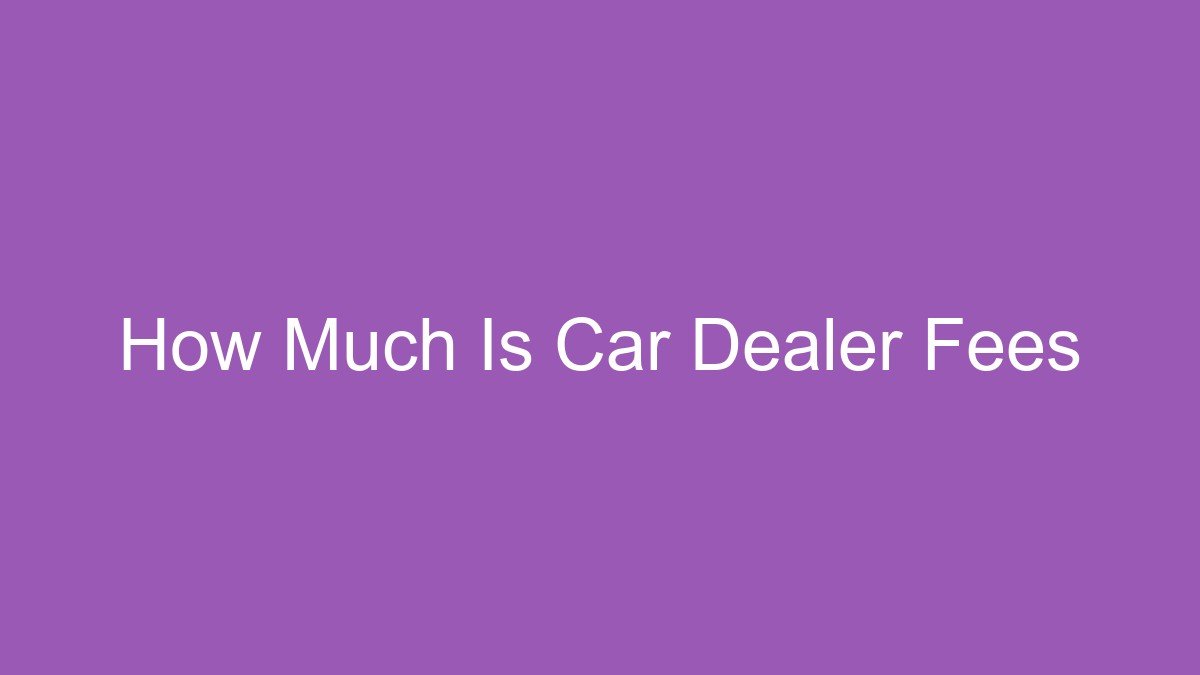
Contents
- Demystifying Car Dealer Fees: How Much Are They & How to Avoid Overpaying?
- FAQ
Demystifying Car Dealer Fees: How Much Are They & How to Avoid Overpaying?
Buying a new car is an exciting milestone! The thrill of a shiny new ride, the smell of fresh upholstery – it’s a fantastic feeling. But then comes the paperwork, and with it, a list of fees that can quickly turn excitement into confusion, or even frustration. “What are all these charges?” you might wonder. “Are they really necessary? And how much should I expect to pay?”
You’re not alone. Car dealer fees can be a labyrinth, often adding hundreds or even thousands of dollars to the advertised price of a vehicle. But don’t worry, we’re here to shine a light on this often-opaque part of the car-buying process.
This detailed guide will demystify car dealer fees, help you understand what they are, provide estimated costs, and equip you with the knowledge to negotiate like a pro and avoid unnecessary charges. Think of it as your car-buying superpower!
🛒 Recommended Product
Why Do Car Dealers Charge Fees Anyway?
Before we dive into the specifics, it’s helpful to understand why these fees exist. Dealerships have overhead costs – sales staff, administrative tasks, inventory, utilities, and more. Some fees compensate them for these operational expenses, while others are legally mandated pass-through costs (like sales tax).
However, not all fees are created equal. Some are legitimate and unavoidable, some cover genuine services, and others are pure profit padding, often hidden in the fine print. Your goal is to distinguish between the two.
The Most Common Car Dealer Fees & What You Need to Know
Let’s break down the types of fees you’ll likely encounter, their typical costs, and most importantly, their negotiability.
A. Mandatory & Non-Negotiable Fees (Generally):
These fees are typically set by the state or municipality and are passed directly to the government. Dealers have little to no control over these.
-
Sales Tax:
- What it is: A tax imposed by your state (and sometimes city/county) on the purchase of goods, including vehicles.
- How much: Varies significantly by state, typically ranging from 0% to over 8% of the car’s purchase price. Some states also tax trade-ins differently.
- Negotiability: Non-negotiable. This is a government charge. However, buying a car in a state with lower sales tax (if you live close to a border) might save you money, but you generally pay tax based on where you register the car.
- Tip: Research your state’s specific sales tax rate before you start shopping.
-
Registration, Tag, and License Plate Fees:
- What it is: Charges to legally register your car with the state’s Department of Motor Vehicles (DMV) or equivalent agency and obtain your license plates.
- How much: Usually ranges from $50 to $300+ annually, depending on your state, the vehicle’s value, weight, or age. Some states have a one-time fee, others annual renewals.
- Negotiability: Non-negotiable. Another government-mandated fee.
- Tip: These are often recurring annual costs, so factor them into your long-term car ownership budget.
-
Title Fee:
- What it is: A charge to legally transfer ownership of the vehicle to your name and issue a new title certificate.
- How much: Typically ranges from $15 to $100, varying by state.
- Negotiability: Non-negotiable. This is also a government charge.
-
Destination Charge (or Freight Charge):
- What it is: This fee covers the cost of transporting the vehicle from the manufacturer’s assembly plant to the dealership.
- How much: Usually ranges from $900 to $1,800. It’s set by the manufacturer, not the dealer.
- Negotiability: Non-negotiable. All buyers of the same model pay the same destination charge, regardless of what dealership they buy from. It’s almost always included in the MSRP (Manufacturer’s Suggested Retail Price).
- Tip: Don’t let a dealer “add” this on top of an advertised price if the advertised price already assumes the MSRP. Check the window sticker (Monroney Label) – the destination charge will be clearly listed there.
B. Potentially Negotiable & Dealer-Specific Fees:
These are where you can often save money! Dealers often add these to cover their costs or increase profit margins.
-
Documentation Fee (Doc Fee):
- What it is: This fee covers the dealership’s administrative costs for processing paperwork, like filing the title and registration, preparing the sales contract, and ensuring compliance.
- How much: Can range from $0 to over $800, depending heavily on state regulations. Some states cap doc fees (e.g., California caps at $85), while others have no limits.
- Negotiability: This is a tricky one. While legally some states cap them, or allow them to be negotiable, many dealerships treat them as non-negotiable, stating it’s a flat fee for all customers. However, you can still try to offset this fee by negotiating a lower overall vehicle price.
- Tip: Research your state’s average or capped doc fee before you go. If a dealer’s doc fee is significantly higher than the state average or cap, question it aggressively. Even if they won’t lower the fee, demand they reduce the car’s price to compensate.
-
Advertising Fee:
- What it is: A charge for the dealer’s local and regional advertising costs.
- How much: Typically $100 to $500.
- Negotiability: Highly negotiable, often avoidable. This is a cost of doing business for the dealership, not directly tied to your purchase.
- Tip: Politely but firmly request to have this fee removed. If they push back, remind them advertising benefits them, not you.
-
Preparation or Reconditioning Fee:
🛒 Recommended Product
- What it is: Covers costs for cleaning, detailing, inspecting, and performing minor service (like an oil change or tire rotation) on a used car before sale. For new cars, it covers “dealer prep” (removing plastic, washing, filling the gas tank).
- How much: Can range from $100 to $500.
- Negotiability: Highly negotiable, often avoidable, especially on new cars. New cars are supposed to arrive ready for sale; “prep” is part of the delivery process already included in the MSRP. For used cars, ensure the work was actually necessary and thorough.
- Tip: Question what exactly this fee covers. If it’s just a wash and vacuum, it’s excessive. Ask for it to be removed.
-
Loan Origination Fee / Acquisition Fee (if financing through the dealer):
- What it is: A fee charged by the lender for processing your car loan. Sometimes it’s passed through the dealer.
- How much: Usually 0% to 1% of the loan amount, or a flat fee of $50-$500.
- Negotiability: Negotiable. This fee can often be waived or reduced, especially if you have good credit.
- Tip: Always get pre-approved for a loan from your bank or credit union before visiting the dealership. This gives you leverage to compare interest rates and avoid unnecessary loan fees.
-
Market Adjustment / Additional Dealer Markup (ADM):
- What it is: An extra fee added to the MSRP when a particular vehicle is in high demand or short supply (e.g., during chip shortages or for highly anticipated new models).
- How much: Can range from a few hundred dollars to tens of thousands, depending on the vehicle and market conditions.
- Negotiability: Highly negotiable in normal markets, but challenging in high-demand markets. This is pure profit for the dealer.
- Tip: Avoid cars with ADM whenever possible. If you absolutely must have that specific car, try to negotiate the markup down significantly. Be prepared to walk away and check other dealerships or wait.
-
“Optional” Add-Ons (Often presented as mandatory):
- What it is: These include things like VIN etching (anti-theft), nitrogen tire fills, paint protection packages, fabric protection, extended warranties, gap insurance, key protection, window tinting, splash guards, mud flaps, etc.
- How much: Highly variable, from $100 to thousands of dollars.
- Negotiability: 100% optional and highly negotiable. These are typically very high-profit items for the dealership.
- Tip: Politely but firmly decline any add-ons you don’t want. Do not let the dealer tell you they are “already installed” or “mandatory.” You have the right to decline. If it’s already installed (like tint), demand they remove the charge or give you a discount on the car. You can almost always get these services/products cheaper elsewhere if you truly want them.
How to Handle Car Dealer Fees Like a Pro: Your Step-by-Step Guide
Knowledge is power, but strategy is key! Here’s how to navigate dealer fees effectively:
-
Do Your Homework Before You Go:
- Research your state’s sales tax, title, and registration fees. Know what to expect for non-negotiable costs.
- Research average doc fees in your state. Some states cap them; others let dealers charge whatever they want.
- Check the MSRP: Know the Manufacturer’s Suggested Retail Price for the specific car you’re interested in.
-
Ask for an Itemized List of ALL Fees Early On:
- As soon as you express serious interest in a car, ask for a complete, itemized breakdown of all charges, taxes, and fees. Request an “out-the-door” price that includes everything.
- Be clear: “I’m interested in this car. Before we get into negotiation, can you please provide a printout of the full out-the-door price, including all taxes, title, registration, and any dealer fees?”
- This is crucial: don’t let them hide fees until the finance office.
-
Understand Every Single Fee:
- Go through the itemized list line by line.
- If you don’t recognize a fee or don’t understand its purpose, ask for a clear explanation. Don’t be shy! A reputable dealer will be transparent.
-
Focus on the “Out-the-Door” Price, Not Just the Car’s Price:
- This is your golden rule for negotiation! Dealers often try to distract you by lowering the vehicle price but then inflate fees.
- Negotiate the total “out-the-door” price. Tell them, “I’m looking to pay X amount total, including all fees, taxes, title, and registration.”
- If they lower the car price but add new fees, they haven’t given you a better deal.
-
Challenge Negotiable Fees:
- For fees like advertising, dealer prep, reconditioning, or any “optional” add-ons, politely but firmly ask for them to be removed.
- Examples: “I appreciate the transparency, but I’m not interested in paying an advertising fee. Can that be removed?” or “I don’t need VIN etching. Please take that off the total.”
- For doc fees: If your state allows negotiation or the fee is excessively high, say, “Your doc fee is higher than average for this area. Can we adjust the vehicle price to reflect that?”
-
Don’t Be Afraid to Walk Away:
- This is your ultimate power! If a dealer is unwilling to budge on excessive fees, tries to pressure you into unnecessary add-ons, or isn’t transparent, be prepared to leave.
- There are other dealerships and other cars. A good deal isn’t worth feeling ripped off or disrespected.
-
Get Everything in Writing:
- Before you sign any final paperwork, ensure the sales agreement reflects all agreed-upon prices and removed fees.
- Scrutinize the final contract in the finance office. Don’t rush! This is where hidden fees sometimes reappear.
Common Mistakes to Avoid When Dealing with Car Dealer Fees:
- Focusing Only on Monthly Payments: This is a classic dealer tactic. They can make any car seem affordable by stretching out the loan term or playing with fees. Always negotiate the total “out-the-door” price first, then discuss financing.
- Assuming All Fees are Mandatory: As you’ve learned, many are not! Question everything.
- Not Asking for an Itemized List Upfront: You lose significant leverage if you wait until the end to see all the fees.
- Forgetting to Research State-Specific Fees: This makes you vulnerable to inflated charges.
- Signing Without Understanding: Never sign a document if you don’t fully comprehend every line item. Ask for clarification until you do.
- Falling for “Already Installed” Add-ons: Just because window tint or nitrogen in tires is “already on the car” doesn’t mean you have to pay for it if you didn’t request it.
Final Thoughts: Your Confidence is Your Best Tool
Navigating car dealer fees might seem daunting, but with this guide, you’re now equipped to approach the negotiation process with confidence. Remember: knowledge is power. By understanding what each fee means, knowing which ones are negotiable, and focusing on the all-important “out-the-door” price, you can save hundreds, if not thousands, of dollars.
🛒 Recommended Product
Go forth and buy your car with clarity and confidence! You deserve a great deal on your new ride.
FAQ
Q. What exactly are car dealer fees?
A. Car dealer fees, also known as administrative fees, doc fees, or processing fees, are additional charges added to the agreed-upon price of a vehicle by the dealership. These fees typically cover the cost of preparing and processing sales paperwork, administrative tasks, and sometimes even the dealer’s advertising costs, and are separate from the vehicle’s negotiated selling price, taxes, and registration.
Q. How much do car dealer fees typically cost?
A. The cost of car dealer fees can vary significantly, ranging from a few hundred dollars to over a thousand dollars, depending on the dealership, the state, and the specific fees imposed. Some states cap certain fees like documentation fees (e.g., under $100-$400), while others have no limits, allowing fees to exceed $1,000. It’s crucial to ask for a full breakdown of all fees.
Q. Are car dealer fees negotiable?
A. While dealers often present some fees, especially documentation fees, as non-negotiable or “standard,” it is generally worth attempting to negotiate them. If the dealer is unwilling to reduce or remove a specific fee, you can try to negotiate a lower overall vehicle price to offset the cost of the fees, effectively achieving the same goal.
Q. What are the most common types of car dealer fees I might encounter?
A. Common dealer fees include:
* Documentation (Doc) Fee: Covers the cost of preparing and processing sales paperwork, title applications, and other legal documents. This is often the largest and most common fee.
* Advertising Fee: Recoups the cost the dealer incurred for advertising the vehicle.
* Preparation (Prep) Fee or Dealer Prep: Charged for cleaning, inspecting, and preparing the vehicle for delivery.
* Dealer Service/Handling Fee: A general fee for various administrative or “handling” costs not covered elsewhere.
* Electronic Filing Fee: Covers the cost of electronically submitting title and registration paperwork.
* It’s important to distinguish these from legitimate government fees like state sales tax, title transfer fees, and registration fees, which are required by law and not negotiable.
Q. Are car dealer fees the same across all states?
A. No, car dealer fees vary significantly by state. Some states have regulations that cap certain fees (like documentation fees) or require them to be disclosed in specific ways. Other states have fewer regulations, allowing dealers more discretion in what they charge and how much. For example, states like California cap doc fees, while others like Florida have no limit, leading to potentially much higher charges. Always research your specific state’s laws regarding dealer fees.
Q. Should car dealer fees be included in the advertised price of a vehicle?
A. Generally, no. Most advertised prices for vehicles typically represent the vehicle’s selling price only. Dealer fees, along with taxes, registration, and title fees, are usually added after the advertised price, leading to a higher “out-the-door” cost. However, some states have “all-in pricing” laws that require dealers to include all mandatory fees (excluding government fees like tax/title/registration) in the advertised price. Always clarify with the dealership what their advertised price includes.
Q. How can I minimize or avoid paying excessive car dealer fees?
A. To minimize dealer fees:
1. Ask Early and Explicitly: Before negotiating the car price, ask for a complete breakdown of all mandatory dealer fees.
2. Research Your State’s Laws: Understand what fees are capped or regulated in your state.
3. Negotiate: Attempt to negotiate down or eliminate individual fees. If unsuccessful, try to get a reduction in the vehicle’s selling price to offset the fees.
4. Compare “Out-the-Door” Prices: Get quotes from multiple dealerships that include all fees, taxes, and the vehicle price to compare the true total cost.
5. Be Prepared to Walk Away: If a dealership is unwilling to be transparent or insists on excessively high, non-negotiable fees, be ready to take your business elsewhere.
Related Articles
How Much Is a Corvette
How Much Does a Corvette Cost? Your Ultimate Guide to Unlocking the Dream Ah, the Corvette. Just uttering the name conjures images of sleek lines, exh…
How Much Is a Grand Wagoneer
How Much Is a Grand Wagoneer? Your Complete Guide to Understanding the Price Tag The Grand Wagoneer. Just the name conjures images of luxurious comfor…
How Much Is a Mclaren 720s
How Much Is a McLaren 720S? Your Ultimate Guide to Understanding the Price Tag The McLaren 720S. Just the name conjures images of blistering speed, ae…
Affiliate Disclosure: As an Amazon Associate, I earn from qualifying purchases made through links on this site.















